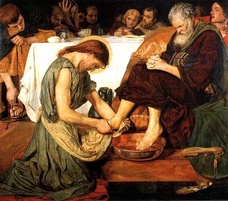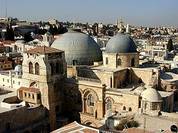
One major problem affecting our country, our world, sometimes our families, and even possibly ourselves, is addiction. Addictions can take over and destroy lives. It may be in the form of drugs, alcohol, gambling, or pornography. What seems to be an exercise of freedom: I can do what I want because I’m free; instead, becomes a form of slavery: I cannot, not do this. It is often very cruel slavery.
In the gospel (Luke 14: 1, 7-14) Jesus warns against another type of addiction. It is something we all want and to a certain extent need: attention, recognition, prestige and honor. When we become addicted to these things we put our lives or at least our emotional well being into the hands of others. Why? Why would we make our happiness and our self worth dependent upon what others do or not do?
Jesus speaks both of being a guest and being a host. What he gives in both instances is not just pointers about good manners, although that can be important. What he shares is a way of life and an insight into the kingdom of God. Jesus speaks of humility and generosity.
We can see humility as weakness, being a doormat, putting ourselves down, lack of ambition to do good, etc. but this is false humility. Real humility is something different.
Real humility is rooted in one word–honesty, about ourselves, about others and about God. Real humility is neither exalting ourselves nor putting ourselves down. These two extremes are in fact rather similar. Whether you speak well of yourself or speak poorly, you are still talking about yourself.
Real humility is how we come to know God as the first reading from the Book Sirach (Sir 3: 17-18, 20, 28-29) tells us. Real humility is the narrow way we that we heard Jesus speak of last week. Real humility includes the ability to listen to really listen to another person
Perfect humility is to realize the depths of God’s love for us.[1]
Humility is something freeing; pride is a high maintenance item. When we are humble, we don’t care where we are seated at the table. When we are humble we do not get too worked up over who is named employee of the month. To be proud is to be worried about many things, but to be humble is to be free.
A couple of months ago I was in a conversation with a group of people. There was an older woman who was recounting a young man she had known in her youth. She said, “I thought he was the handsomest thing.” Then she added, “Of course, he thought the same thing.” In the end, she preferred a man a little less handsome but a little more humble. In other words, humility is attractive.
Jesus says the truth will set you free. If humility is based on truth than humility will also set you free.
We have models of humility in our own lives: People who live their lives and their faith with quiet dignity and virtue. We see the same in the saints. We have another, more important model in Jesus. Jesus was humble but not weak. Jesus was humble but not a doormat. Jesus was humble and yet he spoke very challenging words both about himself and to others.
As Catholic Christians we are to share the sometimes challenging truths of our faith not arrogantly but with a confident humility and a humble confidence.
In his humility, Jesus took the last place, not in the corner of a banquet hall but in front of the world, with the fate of a common criminal, mocked, naked and tortured to death on a cross. Jesus took that last place as a model of strong humility. Because of this, God highly exalted him and he sits at the banquet of kingdom of heaven. On the Cross, Jesus not only saved us, he gave us model of humility that is not weak but very strong.
Humility leads us to generosity. In truth, in humility, we come to realize that all is gift and as we have been given so should we give. St. Paul understood this. St. Therese understood this. The cornerstone of our church quotes her who said, “Everything is grace.”
That is why Jesus says to give when you cannot be repaid. Otherwise, generosity and hospitality just become forms of self-seeking. True generosity involves the sincere gift of self, it is glad when it cannot be repaid.
Again, we have models of this in those around us and in the saints. Again, our model of generosity is also found most perfectly in Jesus. On the cross he not only showed humility but generosity, a generosity carried on by his resurrection and a generosity that continues to overflow to us in this and every celebration of the Eucharist. The Eucharist is the new covenant we hear of in the second reading. The covenant made in sincerity and truth. It says that the blood of Christ is more eloquent than that of Abel. The blood of Abel cried out for vengeance. The blood of Christ cried out for forgiveness and mercy.
The way of Christ is the way of humility and generosity. It is the way of freedom. It frees us from the addiction to honors and recognition. To do this is also an act of faith. It calls us to trust and lead lives of intentional faith which can lead us to intentional humility and intentional generosity.
As disciples of Jesus we are to be ready to take the last place. Jesus may put us somewhere else but Christians are ready to take the last place. Should Jesus take us by the hand and lead us to the last place with him,[2] may we respond with humility and generosity. The way of Christ is the way of humility and generosity. The way of Christ is the way of freedom.
[1]Cf. The Cloud of Unknowing, (New York: Image Books, 1973), 65.
[2]Cf. Clarence Enzer, Everyone’s Way of the Cross (Notre Dame: Ave Maria Press, 1986).
In the gospel (Luke 14: 1, 7-14) Jesus warns against another type of addiction. It is something we all want and to a certain extent need: attention, recognition, prestige and honor. When we become addicted to these things we put our lives or at least our emotional well being into the hands of others. Why? Why would we make our happiness and our self worth dependent upon what others do or not do?
Jesus speaks both of being a guest and being a host. What he gives in both instances is not just pointers about good manners, although that can be important. What he shares is a way of life and an insight into the kingdom of God. Jesus speaks of humility and generosity.
We can see humility as weakness, being a doormat, putting ourselves down, lack of ambition to do good, etc. but this is false humility. Real humility is something different.
Real humility is rooted in one word–honesty, about ourselves, about others and about God. Real humility is neither exalting ourselves nor putting ourselves down. These two extremes are in fact rather similar. Whether you speak well of yourself or speak poorly, you are still talking about yourself.
Real humility is how we come to know God as the first reading from the Book Sirach (Sir 3: 17-18, 20, 28-29) tells us. Real humility is the narrow way we that we heard Jesus speak of last week. Real humility includes the ability to listen to really listen to another person
Perfect humility is to realize the depths of God’s love for us.[1]
Humility is something freeing; pride is a high maintenance item. When we are humble, we don’t care where we are seated at the table. When we are humble we do not get too worked up over who is named employee of the month. To be proud is to be worried about many things, but to be humble is to be free.
A couple of months ago I was in a conversation with a group of people. There was an older woman who was recounting a young man she had known in her youth. She said, “I thought he was the handsomest thing.” Then she added, “Of course, he thought the same thing.” In the end, she preferred a man a little less handsome but a little more humble. In other words, humility is attractive.
Jesus says the truth will set you free. If humility is based on truth than humility will also set you free.
We have models of humility in our own lives: People who live their lives and their faith with quiet dignity and virtue. We see the same in the saints. We have another, more important model in Jesus. Jesus was humble but not weak. Jesus was humble but not a doormat. Jesus was humble and yet he spoke very challenging words both about himself and to others.
As Catholic Christians we are to share the sometimes challenging truths of our faith not arrogantly but with a confident humility and a humble confidence.
In his humility, Jesus took the last place, not in the corner of a banquet hall but in front of the world, with the fate of a common criminal, mocked, naked and tortured to death on a cross. Jesus took that last place as a model of strong humility. Because of this, God highly exalted him and he sits at the banquet of kingdom of heaven. On the Cross, Jesus not only saved us, he gave us model of humility that is not weak but very strong.
Humility leads us to generosity. In truth, in humility, we come to realize that all is gift and as we have been given so should we give. St. Paul understood this. St. Therese understood this. The cornerstone of our church quotes her who said, “Everything is grace.”
That is why Jesus says to give when you cannot be repaid. Otherwise, generosity and hospitality just become forms of self-seeking. True generosity involves the sincere gift of self, it is glad when it cannot be repaid.
Again, we have models of this in those around us and in the saints. Again, our model of generosity is also found most perfectly in Jesus. On the cross he not only showed humility but generosity, a generosity carried on by his resurrection and a generosity that continues to overflow to us in this and every celebration of the Eucharist. The Eucharist is the new covenant we hear of in the second reading. The covenant made in sincerity and truth. It says that the blood of Christ is more eloquent than that of Abel. The blood of Abel cried out for vengeance. The blood of Christ cried out for forgiveness and mercy.
The way of Christ is the way of humility and generosity. It is the way of freedom. It frees us from the addiction to honors and recognition. To do this is also an act of faith. It calls us to trust and lead lives of intentional faith which can lead us to intentional humility and intentional generosity.
As disciples of Jesus we are to be ready to take the last place. Jesus may put us somewhere else but Christians are ready to take the last place. Should Jesus take us by the hand and lead us to the last place with him,[2] may we respond with humility and generosity. The way of Christ is the way of humility and generosity. The way of Christ is the way of freedom.
[1]Cf. The Cloud of Unknowing, (New York: Image Books, 1973), 65.
[2]Cf. Clarence Enzer, Everyone’s Way of the Cross (Notre Dame: Ave Maria Press, 1986).
Author: Reverend Joseph I. Cisetti
September 1, 2013–22nd Sunday of Ordinary Time
September 1, 2013–22nd Sunday of Ordinary Time
 RSS Feed
RSS Feed

